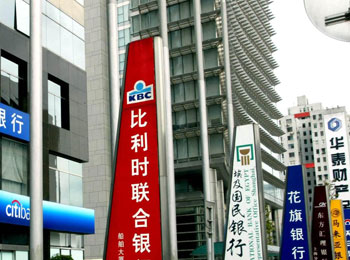| Home / China / Features | Tools: Save | Print | E-mail | Most Read |
| Shanghai Bridging Dreams and Reality |
| Adjust font size: |
-- It may look like New York, but the real picture is very different
Stanley often finds himself being interviewed by Chinese financial and economic media when there are financial policy changes concerning foreign banks. What Stanley doesn't know is that his frequent exposure in the media has won him many fans. Li Xiaolin is one of them. After graduating from a university in Beijing, Li went to Shanghai, and Stanley, or rather Stanley's job, has become his dream. Because of this, Li frequently travels to Lujiazui just to feel its financial atmosphere. Whenever a friend visits him, Li will take him for a stroll in Lujiazui. The place has become familiar scenery for Shanghai, where financial institutions clump together. Majoring in financial management, Li dreams to work in one of those splendid buildings someday. Currently, he is a sales person in a company. "Looking at Lujiazui, I can feel the temptation of money," Li said. Li is not alone. This kind of temptation attracts numerous people to the city-rich or poor-who regard Shanghai as the place to make a fortune. Choosing Shanghai "Shanghai looks like New York," many people who have been to both cities have said. The resemblance between Shanghai and New York comes from various aspects. Shanghai is situated on the eastern coastal area of the nation, as is New York. New York has many skyscrapers and is the economic and financial center of the United States. Shanghai is the same in China. Many international financial institutions have chosen to locate to Shanghai, just as they do to New York. Over 300 foreign financial institutions have established branches or headquarters in Shanghai, including the Citibank and Bank of America. Not long ago, HSBC, Standard Chartered, Bank of East Asia and Citibank were incorporated locally in China and their headquarters located in Shanghai. Citibank is the first American bank to operate in China. On May 12, 1902, the International Banking Corp., one of Citibank's forbears, established a branch in Shanghai, which was the first institution opened by Citibank in Asia. With the outbreak of the World War II, Citibank's business in China ceased. In 1985, 45 years after it left China, Citibank resumed business here. "Shanghai is the financial hub of China and is a highly open and internationalized city," said Stanley. "If you want to enter China, Shanghai is the best choice." He noted that was why Citibank chose Shanghai as its regional headquarters. Several domestic financial institutions also choose Shanghai. Last August, the People's Bank of China, the nation's central bank, set up its second headquarters in Shanghai, making Shanghai's status as a financial center more remarkable. Currently, there are over 700 foreign and domestic financial institutions operating in Shanghai. Shanghai has been forming a modern financial market system by integrating capital, currency, foreign exchange, commodity futures, financial futures, gold, property right exchange and insurance solutions. The Lujiazui Finance & Trade Zone, covering an area of 32 square km, has become the China's"Wall Street." Graduates with a financial background are often keen to work in Shanghai. Li said that over 20 of his 36 university alumni are working there. "The temptation of Shanghai is extremely huge," said Li. At present, there are over 160,000 people working in the financial sector in Shanghai, which means one out of every 100 employees in the city is working in the financial field. Fang Xinghai, Deputy Director of the Financial Office of the Shanghai Municipal Government, has been in contact with all of the financial institutions in Shanghai. Fang stated that amid fast economic development, Shanghai has actively built up modern infrastructure facilities in accordance with its image as a metropolis. Shanghai now enjoys relatively advanced transportation, postal and telecommunications infrastructure. Shang-hai's cultural environment is advanced too. First-class cultural facilities and an open atmosphere have greatly promoted Shanghai as a modern city. Shanghai embraces a developed business environment, free information communication and a convenient business catering system. In addition, it is prominent in the areas of social security, safety facilities, environmental protection and other complementary services. "The modern infrastructure of Shanghai, as a financial center, has been continually perfected," said Fang. Financial history of Shanghai Opposite to Lujiazui is Shanghai Waitan (the Bund), surrounded by European-style architecture built between the late 1890s and the early 20th century. Most of those European-style buildings were used for financial purposes, and some still are. Through those buildings, people can still be reminded of the prosperous old days of Shanghai's financial industry.
Shanghai has been a well-known financial center for years. In 1847, the Great Britain Oriental Banking Corp. entered Shanghai, and became the first foreign bank operating in China. The Shanghai Sharebroker Association, established in May, 1891, was the first stock exchange in China. In May 1897, the first bank established by Chinese was set up in Shanghai. In the 1930s, Shanghai became the business and financial hub of China, as well as the most important financial center in Asia, especially in East Asia. At that time, Shanghai boasted developed financial markets, including domestic and foreign currency exchange, as well as gold and silver markets. Meanwhile, the futures market was also prosperous. In terms of the capital market, Shanghai was the third largest stock and bond market following New York and London. Company stocks from all countries could be traded in Shanghai. Without doubt that Shanghai is the cradle of China's financial development. However, due to World War II, nearly all foreign banks terminated their business in China, leading to the financial slump of Shanghai. Entering the 21st century, Shanghai is taking shape again. Many people like to visit the Bund to look at the European architectures and feel the past prosperity of this modern city. "The historical assets are precious intangibles for Shanghai," said Li Enqiang, research fellow with the National Development and Reform Commission. "The first city foreign financial institutions think of when they are about to enter China is Shanghai, signaling the rich historical value of the city." Long way to go "The financial system in Shanghai is relatively mature, and Shanghai has become a magnet for financial institutions and professionals," said Fang, adding that Shanghai has the potential to become an international financial center. Fang believes that with the listing of state-owned commercial banks and the deepened reform in the capital market, Shanghai is fast catching up with the international level. Wu Xiaoqiu, professor with the Financial and Securities Institute of Renmin University of China, presented a list of favorable factors for Shanghai to become an international financial center. First is the fast development of the national economy and the country's ever-expanding economic scale. By the end of 2005, the economic scale of China ranked fourth in the world with an annual GDP growth hovering around 10 percent. This kind of high GDP growth will continue for a long period of time, providing solid economic conditions for Shanghai. Second, China's imports and exports are expanding rapidly, and the frequent international economic exchange will help to turn a domestic financial center into a global one. "The most important factor is the stable Chinese financial environment," said Wu. Shanghai has always placed financial development as the priority in its strategic development. At present, domestic financial institution reform is drawing to a close. The Industrial and Commercial Bank of China, China Construction Bank and Bank of China have all been successfully listed. Various financial institutions have been brought into the track of sound, sustained and steady development. Furthermore, China has entered an era of excessive liquidity, which enables it to provide services to the international capital market. "Due to these reasons, I believe that Shanghai will become an international financial center in the near future," said Wu. Shanghai, with over 18 million residents, is the most populous city on the Chinese mainland. Apart from favor from financial institutions, Shanghai has also won the trust of international industrial tycoons, such as General Motors, IBM and ALU. "It is obvious that Shanghai will become a major financial center in Asia and will likely surpass such status in the future," said Stanley. It is also acknowledged that there is a long way to go before Shanghai becomes a real international financial hub. Lu Hongjun, President of Shanghai Institute of International Finance, contends that Shanghai needs to improve in terms of financial innovation, financial risk prevention and financial personnel. Lu stated that the financial sector's risk management should be further strengthened, as the transparency of the Chinese financial market is not high enough. In terms of financial innovation, although financial derivatives such as stock index futures and options and equity futures are allowed to be traded on the market soon, Shanghai is still lagging behind Hong Kong and Singapore, and even South Korea and India. Lu suggested that Shanghai should work on its soft infrastructure construction, for instance, the credit system, derivative innovation centers, and transaction and accounting centers. Those indexes are much more important than tangible construction, but Shanghai is still very weak in this area. Regarding financial personnel, Shanghai lacks senior financial personnel in such fields as company leadership, operational management and product innovation. Experts estimated that Shanghai needs 1 million specialized personnel to help upgrade it into an international financial center. (Beijing Review July 30, 2007) |
| Tools: Save | Print | E-mail | Most Read |
 |
| Related Stories |

